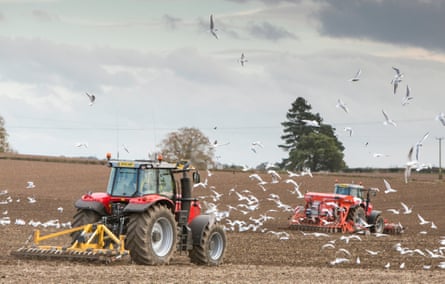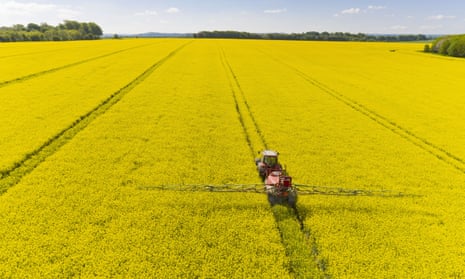The UK will back a total ban on insect-harming pesticides in fields across Europe, the environment secretary, Michael Gove, has revealed.
The decision reverses the government’s previous position and is justified by recent new evidence showing neonicotinoids have contaminated the whole landscape and cause damage to colonies of bees. It also follows the revelation that 75% of all flying insects have disappeared in Germany and probably much further afield, a discovery Gove said had shocked him.
Neonicotinoids are the world’s most widely used insecticide but in 2013 the European Union banned their use on flowering crops, although the UK was among the nations opposing the ban. The European commission now wants a total ban on their use outside of greenhouses, with a vote expected in December, and the UK’s new position makes it very likely to pass.
“The weight of evidence now shows the risks neonicotinoids pose to our environment, particularly to the bees and other pollinators which play such a key part in our £100bn food industry, is greater than previously understood,” said Gove. “I believe this justifies further restrictions on their use. We cannot afford to put our pollinator populations at risk.”
In an article for the Guardian, Gove said: “As is always the case, a deteriorating environment is ultimately bad economic news as well.” He said pollinators boost the yield and quality of UK crops by £400m-£680m every year and said, for example, gala apple growers are now having to spend £5.7m a year to do replace the work of lost natural pollinators.
Gove said the evidence of neonicotinoids’ harm to pollinators has grown stronger since 2013, including a landmark field trial published in July that showed neonicotinoids damage bee populations, not just individual insects, and a global analysis of honey revealing worldwide contamination by the insecticides.
Q&AWill pollinator populations naturally recover if pesticide use falls?
Show
Drastically cutting pesticide use, as appears perfectly possible on most farms, will certainly help. The insecticides called neonicotinoids are now pervasive around the world, affecting both wild pollinators and kept honey bees. But wild insect numbers, which may well have plummeted by 75% in recent decades, are also greatly affected by the ongoing destruction of natural habitats and the food they contain. In the UK alone, the areas inhabited by common insects has fallen by 30-60% over the last 40 years. Honey bees can also suffer from outbreaks of disease like the varroa mite and nosema parasite. Finally, climate change also appears to be damaging some insect populations. So slashing pesticide use is necessary - but not sufficient - to allow insects to recover.
This and other research was examined by the UK’s Expert Committee on Pesticides (ECP), which published its updated advice on Thursday. “Exposure to neonicotinoid pesticides under field conditions can have an unacceptable effect on honeybee health” they concluded. “Such unacceptable effects are occurring at a landscape level and between seasons.”
Professor Ian Boyd, chief scientific advisor at the Department for Environment, Food and Rural Affairs, said: “The important question is whether neonicotinoids’ use results in harmful effects on populations of bees and other pollinators as a whole. The available evidence [now] justifies taking further steps to restrict the use of neonicotinoids.”
Boyd warned in September that the assumption by regulators around the world that it is safe to use pesticides at industrial scales across landscapes is false. This followed other highly critical reports on pesticides, including research showing most farmers could slash their pesticide use without losses and a UN report that denounced the “myth” that pesticides are necessary to feed the world.

Gove’s decision has delighted campaigners and scientists who have long argued that heavy pesticide use, along with the destruction of habitat and disease, are having a devastating impact on insects.
“Michael Gove is to be congratulated for listening to the experts on this issue and backing tougher restrictions,” said Friends of the Earth’s chief executive Craig Bennett. “But lessons also need to be learned – we now need to move away from chemical-intensive farming and instead boost support for less damaging ways of tackling persistent weeds and pests.
“We warmly welcome the UK’s change of position,” said Matt Shardlow, at insect conservation group Buglife. “Brexit will give the UK more control over the health of our ecosystems and it is essential in doing so that we apply the highest standards of care.”
He said the EU had been stuck on the issue of a full neonicotinoid ban, unable until now to get sufficient votes from member states: “In taking this ‘unfrozen moment’ in British politics to put bees and science at the centre of our priorities for sustainable agriculture, Michael Gove may also unfreeze the EU and secure an EU-wide ban that will benefit insects across the continent.”
Chris Hartfield, the National Farmers Union’s acting chief science adviser, said: “Farmers are acutely aware that bees play a crucial role in food production and have done an enormous amount to help them.” But he said the committee’s finding of “unacceptable effects” came despite their acknowledgement of a gap in understanding in whether neonicotinoids damage overall ecosystem services: “In our view, the ECP has leapt beyond its brief.”
But Gove said: “While there is still uncertainty in the science, it is increasingly pointing in one direction.” He said a post-Brexit farming subsidy system would channel more money into environmentally sustainable ways of farming.

Comments (…)
Sign in or create your Guardian account to join the discussion